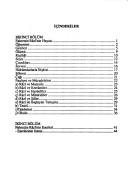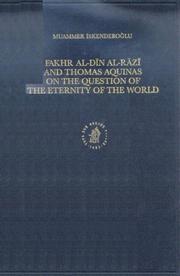| Listing 1 - 5 of 5 |
Sort by
|

ISBN: 975170782X 9789751707826 Year: 1991 Publisher: Ankara: Kültür Bakanlığı,
Abstract | Keywords | Export | Availability | Bookmark
 Loading...
Loading...Choose an application
- Reference Manager
- EndNote
- RefWorks (Direct export to RefWorks)
Book
ISBN: 2841613992 9782841613991 Year: 2008 Publisher: Beyrouth: Albouraq,
Abstract | Keywords | Export | Availability | Bookmark
 Loading...
Loading...Choose an application
- Reference Manager
- EndNote
- RefWorks (Direct export to RefWorks)
Fahr al-Dîn al-Râzî (1149-1209), persan originaire des environs de Téhéran, est un des représentants par excellence de la pensée sunnite classique. A la fois, exégète du Coran, théologien et philosophe, il déploie son Grand Commentaire, tel une somme reflétant l'ensemble du savoir de son temps, comme ont su le faire, en occident, Pico della Mirandola, Cornelio a Lapide et Thomas d'Aquin. Trois tendances marquent son texte : d'abord, un usage fréquent et rigoureux de la raison ; ensuite, un goût prononcé pour les considérations linguistiques ; enfin, une vision spirituelle de couleur mystique dans laquelle on voit facilement l'influence du milieu akbarien d'Ibn 'Arabî. Ce travail est une monographie précise sur les notions et les exemples de secrets, de subtilités, de nuances et d'ordre que l'auteur découvre dans le texte coranique et qui constituent les éléments fondamentaux de sa beauté. On se rendra compte que, par rapport à ses prédécesseurs et à ses contemporains, al-Râzî fait preuve de créativité personnelle, d'ingéniosité intellectuelle, de finesse imaginative, de capacité d'émerveillement et de profondeur spirituelle ; ce qui le rend attachant et intéressant même pour un homme d'aujourd'hui. Cette monographie est aussi un prétexte servant à donner une idée assez complète sur ce genre de commentaire coranique, en général. Elle peut donc être utile à l'historien de la pensée qui n'a pas directement accès aux sources arabes. Le musulman non-arabisé pourra y trouver un aliment pour sa foi et le non-musulman, une occasion d'ouverture sur une culture dont l'accès lui est souvent rendu difficile à cause de la langue dans laquelle elle s'exprime
Islamic philosophy --- Qur'an --- Islam --- Rāzī, Fakhr al-Dīn Muḥammad ibn ʻUmar, - 1149 or 1150-1210

ISBN: 9789004453425 9789004124806 Year: 2002 Publisher: Leiden; Boston : BRILL
Abstract | Keywords | Export | Availability | Bookmark
 Loading...
Loading...Choose an application
- Reference Manager
- EndNote
- RefWorks (Direct export to RefWorks)
This volume examines the approaches of Fakhr-al-Dīn al-Rāzī (d. 1209) and Thomas Aquinas (d. 1274) to the question of the eternity of the world, which was one of the most heated issues of debate between theologians and philosophers in the Middle Ages. The first chapter of the book gives some background to the discussion from Greek philosophy, early Judaeo-Christian and Muslim traditions. The second and the third chapters discuss the approaches of Rāzī and Aquinas respectively to the question of the eternity of the world. The last chapter compares their approaches, brings out some similarities of their approaches between them as well as in relation to their own traditions, Islam and Christianity respectively. The book tries to show that though they were theologians, both Rāzī and Aquinas were more in line with the philosophers than their fellow theologians.
Eternity --- Eternity --- Islamic philosophy --- Philosophy, Comparative --- Philosophy, Medieval --- History of doctrines --- History of doctrines --- History --- History --- Rāzī, Fakhr al-Dīn Muḥammad ibn ʻUmar, 1149 or, --- Thomas, Aquinas, Saint, --- Thomas, --- Rāzī, Fakhr al-Dīn Muḥammad ibn ʻUmar,
Book
ISSN: 09292403 ISBN: 9789004400481 9004400486 9004400494 9789004400498 Year: 2019 Volume: 156 Publisher: Leiden ; Boston : Brill,
Abstract | Keywords | Export | Availability | Bookmark
 Loading...
Loading...Choose an application
- Reference Manager
- EndNote
- RefWorks (Direct export to RefWorks)
Dans cet ouvrage, Ahmed Oulddali étudie les idées psychologiques et épistémologiques qui sous-tendent l’exégèse spéculative de Faḫr al-Dīn al-Rāzī. Connu pour être l’un des rares théologiens musulmans à avoir proposé une interprétation philosophique du Coran, Rāzī se révèle ici un penseur novateur, profondément convaincu de la nécessité de prendre appui sur les sciences et les méthodes rationnelles pour appréhender la révélation. Son rejet formel du littéralisme et ses multiples emprunts à la philosophie d’Avicenne apparaissent comme la conséquence d’une conception de la connaissance dans laquelle la raison joue un rôle déterminant. Basée sur une documentation très riche, comprenant de nombreuses sources arabes, la présente étude offre une vue d’ensemble des enjeux philosophiques, théologiques et exégétiques auxquels répond la pensée de Rāzī. In Reason and Revelation in Islam , Ahmed Oulddali presents the psychological and epistemological ideas which underlie Faḫr al-Dīn al-Rāzī’s speculative exegesis. Known as one of the few Muslim theologians to have proposed a philosophical interpretation of the Qurʾān, Rāzī appears here as an innovative thinker, deeply convinced of the need to rely on rational methods to understand revelation. His formal rejection of literalism and his multiple borrowings from Avicenna’s philosophy are explained as a consequence of a conception of knowledge in which reason plays a decisive role. Richly infused with illustrative texts and original translations from Arab sources, Oulddali’s book offers an overview of the philosophical, theological and exegetical issues to which the thinking of Rāzī responds.
Rāzī, Fakhr al-Dīn Muḥammad ibn ʻUmar, --- Qurʼan --- Al-Coran --- Al-Qur'an --- Alcorà --- Alcoran --- Alcorano --- Alcoranus --- Alcorão --- Alkoran --- Coran --- Curān --- Gulan jing --- Karan --- Koran --- Koranen --- Korani --- Koranio --- Korano --- Ku-lan ching --- Ḳurʼān --- Kurāna --- Kurani --- Kuru'an --- Qorān --- Quräan --- Qurʼān al-karīm --- Qurʺon --- Xuraan --- Κοράνιο --- Каран --- Коран --- קוראן --- قرآن --- Commentaries --- History and criticism. --- Language, style. --- Qur'an --- History and criticism --- Language, style --- Qur'an - Commentaries - History and criticism --- Qur'an - Language, style --- Rāzī, Fakhr al-Dīn Muḥammad ibn ʻUmar, - 1149 or 1150-1210 - Mafātīḥ al-ghayb

ISBN: 9004103627 9004471766 9789004103627 9789004471764 Year: 1996 Volume: 22
Abstract | Keywords | Export | Availability | Bookmark
 Loading...
Loading...Choose an application
- Reference Manager
- EndNote
- RefWorks (Direct export to RefWorks)
This work contains indexes of the proper names and the subjects of the Great Commentary of Faẖr al-Dîn al-Râzî, which comprises 32 volumes and forms an immense encyclopedia of the Middle Ages, invaluable for the knowledge of Classical Islam. The work is based on the Beirut edition (1981), but it contains a synopsis which allows for the use of the editions of Cairo (1933) and Teheran (n.d.). In the introduction, one finds a synthesis of the text's important elements, the statement of exegetical principles of the Great Commentary , and information relating to its chronology and authorship.
Razi, Fakhr al-Din Muhammad ibn 'Umar, --- Indexes --- Koran --- Coran --- Commentaries --- Commentaires --- Rāzī, Fakhr al-Dīn Muḥammad ibn ʻUmar, --- Qur'an --- 297.181 --- Islam: canonieke boeken; Koran --- Razi, Fakhr al-Din Muhammad ibn 'Umar --- -Indexes --- 297.181 Islam: canonieke boeken; Koran --- Indexes. --- Qurʼan --- Al-Coran --- Al-Qur'an --- Alcorà --- Alcoran --- Alcorano --- Alcoranus --- Alcorão --- Alkoran --- Curān --- Gulan jing --- Karan --- Koranen --- Korani --- Koranio --- Korano --- Ku-lan ching --- Ḳurʼān --- Kurāna --- Kurani --- Kuru'an --- Qorān --- Quräan --- Qurʼān al-karīm --- Qurʺon --- Xuraan --- Κοράνιο --- Каран --- Коран --- קוראן --- قرآن --- Rāzī, Fakhr al-Dīn Muḥammad ibn ʻUmar, - 1149 or 1150-1210 - Mafātīḥ al-ghayb --- Middle East and Islamic Studies --- Explanation
| Listing 1 - 5 of 5 |
Sort by
|

 Search
Search Feedback
Feedback About
About Help
Help News
News